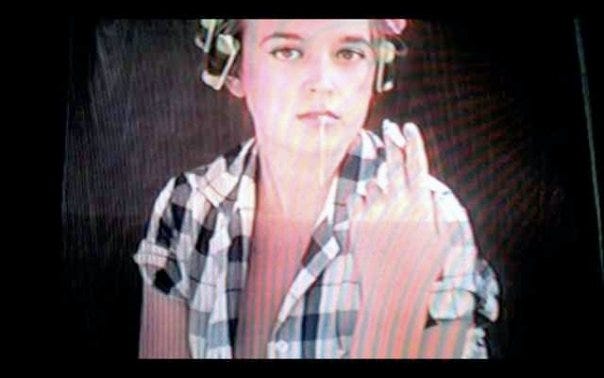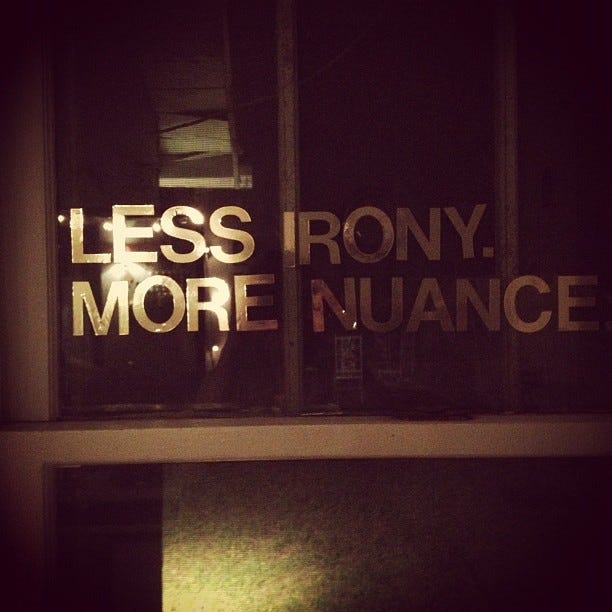I find it hard to remember what music they played at the Beauty Bar in Austin during the indie sleaze years, which is funny because I was there every single Saturday, I mean Jesus Christ, 100% of the time, for years. Or it would be more accurate to say that I started the night at Beauty Bar, and then ended up at a dark vibes house party in a South Austin apartment complex where people were trying to get high on morning glory seeds, or at Taco Cabana (blessedly), or under the rock wall at Club DeVille watching a stranger do a floating-cigarette magic trick, or eventually, toward the end of that enchanted time, in the condo high-rise of a party pig my roommate and I had just met, who had promised to make us Hot Pockets.
I don’t seem like a club rat anymore, not even a reformed one. It’s Friday night and I’m home, in a cashmere cardigan, doing my taxes. I don’t buy highly flammable dresses from Urban Outfitters anymore. I’ve been sober for 8 years and off cigarettes for 4. I haven’t listened to French touch except … oh lol I never stopped listening to French touch, but only on the elliptical trainer at the gym, and for the longest time I wouldn’t, like, admit it. (“D.A.N.C.E.” is still the Platonic ideal of a cardio jamb.)
But I was there, I drank the Sparks, I was in bands, I went to SXSW like it was a gladiator sport or some kind of mythic trial, and I searched endlessly for the secret room in the Fader Fort where they gave out free white jeans. I played house parties in my underwear and gold lamé fishnet tights and a T-shirt with a cartoon zombie girl face which said MYSELF.
Of course, at the time, there was no unifying principle to any of this. It wasn’t called “indie sleaze.” Myspace was the only social media, and it was basically an irony game. Everything was an irony game. I hadn’t always embraced it. When I first moved to Austin for poetry grad school, I detected a layer of commentary or distance in everything the other MFA people said. There was some opacity. Nobody was feeling or processing anything outwardly, there was no sincerity, I couldn’t figure it out. I asked G, who would become a much treasured friend, “Is anybody here ever sincere?” and he said, “No.”
Which wasn’t entirely true. There was actually a massive capacity for sincerity, but it existed somehow only in proximity to the poets who were holy to us: Brigit Pegeen Kelly, C.D. Wright, Yusef Komunyakaa, Nicanor Parra. Or in a Sacred Harp sing where we drove, hungover in our Ray-Bans, to I think Lockhart and sang “What Wondrous Love Is This?” in the full sun with church normies who were nothing but sincere. There was actually a tremendous reverence for the sublime, to the extent that it was unspeakable, it could only be handled in some kind of chilly decontamination suit. Bolaño’s 2666 will always be the literary ideal of that time for me—a collage of frosty surfaces and ominous moods which reference a sort of hidden chamber under everything, pointing to the negative space under and outside the novel, and locating that as the secret heart of literature. Necessary for the sublime, because the secret every book tells is that what is holy is evil as much as it isn’t.

Maybe. I don’t know if anyone would agree with this—there is no consensus in consensus reality at the moment of its occurrence, no consensus of what it all means, anyway. In AA meetings people are always talking about “I drank because I couldn’t handle my feelings” or “I drank because I didn’t fit in,” and I kind of think, bullshit. At the time, I never knew why I drank. There was just a neon light-up sign in my brain that flashed on, with sirens, and said DRINK DO IT NOW I LOVE THIS. And nobody was like, “Let’s use irony to hold open a space for unspeakable beauty, like the liquid center of a Halls cough drop.” And lots of the sleaze invited a kind of ethical numbness at best which invited and protected cultural appropriation and all that we would eventually come to call problematic. (And I’m not innocent—one of those bands I was in was, ugh, a rap band. A massive yikes for which I still atone.)
I’m thinking about all of this in reference to an article in The Cut called “A Vibe Shift Is Coming: Will any of us survive it?” which opines (although not very cogently) that we’re about to touch back on that time, based on a recent article about the party photographer the Cobrasnake and Meg Superstar Princess, a new party girl avatar doing the old Cat Marnell bit (skinny, drunk, angel dust, date a graffiti artist and wear dirty white denim) on Blogspot and in the LES (I guess). But it’s a confusing article because it presents the topic of “vibe shift” as a tidal force which might, le shock, leave some of us geriatric millennials behind with dumb pink girl boss enameled cookware and corporate Memphis start-up graphics made in Canva and pasted all over our branded-ass Instagrams, but it doesn’t really address why that might happen. I think, although I’m not sure, that the writer is saying something about not being able to survive a return to the game of the irony dare, which is Meg Superstar Princess’ genre of choice. (The game is: “U mad?”) Or maybe she wants to say that we have reached an exhaustion level with the public sport of articulating the problematic in the woke olympics, except she’s too afraid that to even insinuate such a thing would result in comments section pile-on (which is exactly the reason for the exhaustion). Although it might just be total garden-variety anxiety about getting old, and not being cool anymore. (To which I say: speak for yourself.)
But there’s something to it. Maybe this vibe shift connects with the exhaustion around trauma narratives—both in reggo life and as a literary framework. (My take: We lazily began using trauma as the catch-all reason for any kind of literary fragmentation or ontological splintering in a book, because it’s an organizing principle for challenging narrative formats which reduces everything formally difficult or interesting to a kind of mimetic psychology. Keeping everything solidly in the realm of the self and the human, instead of the wild, vast, sublime world. Ahem. Hair flip.) And maybe it’s just super fucking obvious that the pendulum will swing back from an era of exceptionally cautious discourse based on the fact that if you say anything on Twitter, someone with a massive shame complex can come along and castigate you for not taking into account some facet of some way that somebody could be traumatized. Because we aren’t just tired of trauma, we’re tired of the notion that everybody is responsible for everybody’s trauma all the time, and you better think of all eventualities before you say anything.
(All of which I participated in, too—me on Facebook in 2016? A shame hydrant spraying every which way. For which I also atone.)
There was no Instagram or Twitter during indie sleaze. (I remember listening to an NPR news minute about SXSW tech which mentioned the launch of Twitter, and I thought: “What a stupid fucking idea. That’ll never take off.”) Having an iPhone was a weird and fascinating flex. The possibility that anything you said or did online might open you up to a barrage of shit wasn’t really a thing. Facebook wasn’t all that obviously finger-fucking our limbic systems. It was a lot easier to make things and take risks, even though some of those risks were definitely mistakes. Mistakes didn’t feel fatal. Without Google maps you’re just a fucking pinball in a chaos machine, and it feels a lot more valuable to find the party. And I think that’s what this vibe shift is about. And why I welcome it. I’m not sure, ultimately, why any of us wouldn’t survive the vibe shift. They are imminently survivable. They aren’t law. They aren’t even all that volitional: we just get tired of things together, which isn’t a surprise.
So yeah, I’m down. With some caveats. I hate that in the Red Scare reddit, it’s yet again totally cool to call people fat. (That was the moment that cemented the vibe shift for me, actually. Because being mean was kind of part of the deal. U mad? Remember Mean Week at HTMLGiant?) I don’t think we need to give Tao Lin the microphone again. I want to retain, with subtlety, the ways we’ve used our collective commentary mind to unravel and articulate institutional power, although it would be great if we could do that in a way that wasn’t primarily performative. Like … the trauma model is useful! It is so useful. It gives you a way to understand yourself and others which is way more empathetic and realistic than, I guess, just thinking everyone is an asshole. It reminds me of how when I got the bipolar II diagnosis I was like, “Oh, thank god. A framework for understanding.” But a framework becomes fucked up when you make it an identity. We lost our subtlety muscle when we lost our attention spans and got hooked on bad vibes juice from arguing with strangers. If the vibe shift moves away from that, I will be stoked.
And by the way, it was Armand Van Helden that we were dancing to at the Beauty Bar. I’m pretty sure. “I Want Your Soul.” But who can trust a starry memory?





